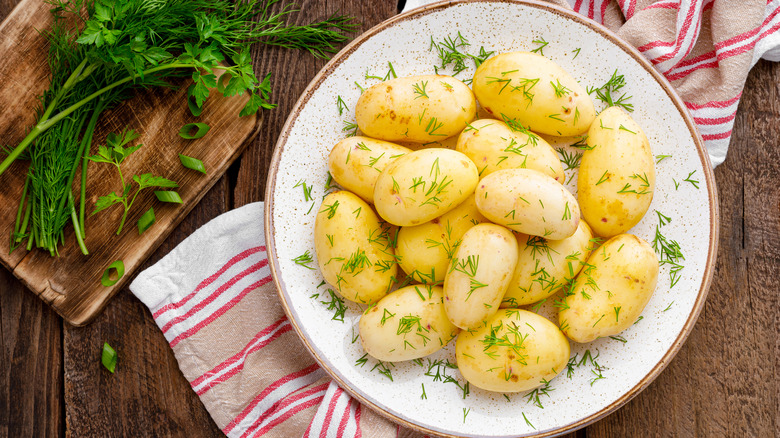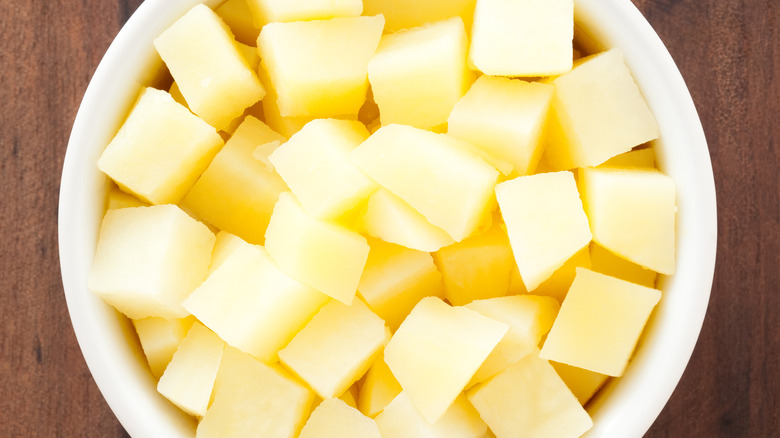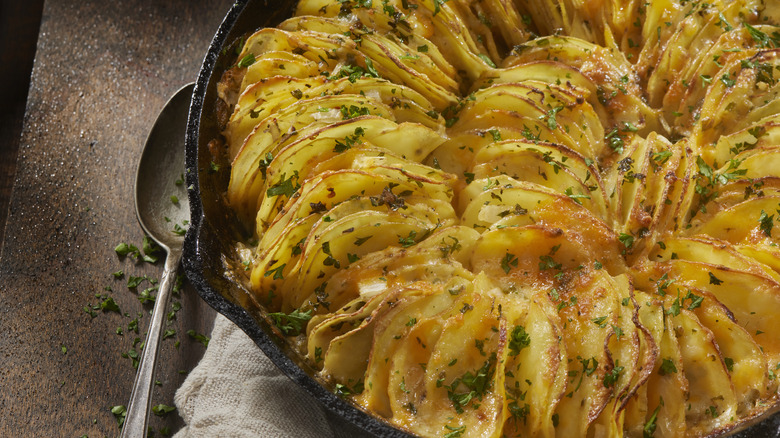The One Ingredient That Can Prevent Mushy Boiled Potatoes
We've all experienced it: the disappointing moment when you slice into a boiled potato, only to reveal its mushy (dare we say, gluey) center. There's nothing like an overly softened boiled potato to put a damper on a French-inspired potato salad with tangy red wine vinaigrette or any good mashed potato side dish. Luckily, there's one ingredient that can fix this mushy potato predicament: vinegar.
When a small amount of vinegar is added to a pot of boiling water, along with a generous sprinkling of salt, the resulting boiled potatoes hold their shape while softening throughout just the right amount. When the acidic ingredient is added to the water, it draws out some of the excess starch that could cause gluey textures while forming a sort of thin film around the spud's exterior. Think of this layer as a protective barrier that prevents the potatoes from becoming waterlogged and overly soft over the boiling process. This helps them retain their shape and structure as they cook evenly throughout the boil.
Vinegar helps boiled potatoes hold their shape
The presence of acid in boiling water can retain structure-providing carbs in potatoes, so they don't break down and soften as easily as they would in a pot of boiling water sans vinegar. Since the objective is to fully cook the potatoes (without making them mushy), it's important to note that you just need a bit of vinegar to get the job done. Adding too much vinegar could cause the potatoes to cook way slower than desired, so it's all about balance. Finding the right amount of vinegar might take a bit of experimentation, depending on the type of potatoes you're using (waxy vs. starchy varieties, for instance).
As a general rule though, you just need to add a tablespoon or two of vinegar to every couple quarts of boiling water. It's that simple: Add your vinegar, salt your water, then transfer your washed, dried, and cut or peeled potatoes to the pot. The vinegar solution may cause the cook time to be a bit longer than you're used to, so check your potatoes often for doneness. They will be ready to remove and cool from the pot when they are tender through the middle when pieced with a fork. The texture will be soft, but not falling apart, thanks to the addition of the acidic ingredient.
This trick works exceptionally well for par-boiling
Adding vinegar to your boiling water to cook the perfect potatoes is a trick worth keeping up your sleeve. There are, however, certain instances when this cooking method is especially useful in the kitchen. Specifically, vinegar is a star ingredient when it comes to parboiling potatoes, or boiling them for a short time prior to tossing them in the oven to bake or crisping them up in the fryer. Since vinegar helps to retain the potatoes' shape and structure, parboiling potatoes in a vinegar solution prior to frying them will help you achieve fries with a crisp exterior and soft fully-cooked interior. No more falling-apart, mushy potato wedges or waffle fries.
When cooking up skillet potatoes for a slow Sunday morning brunch, parboiling potatoes in vinegar before adding them to the skillet will help them cook quicker and keep their uniform cubed shape, instead of getting smooshed up in the pan. Parboiling in vinegar also works like magic in baked dishes like potatoes au gratin, to keep the signature scalloped potato shape. Plus, adding both vinegar and salt to your boiling water adds a nice balance of tangy and savory flavor, making this cooking method a win-win on all fronts.


